July 1 is a special day in Suriname every year. Tens of thousands of people in Suriname and the Netherlands celebrate Keti Koti on this day. But what exactly is the holiday?
While many Dutch people are unfamiliar with Keti Koti, it is an important holiday for the Surinamese and Antilleans.
It commemorates the abolition of slavery in Dutch America and the West Indies in 1863, making the Netherlands one of the last European countries to abolish slavery and the slave trade.
So, what exactly is Keti Koti? Well, here is everything you need to know about this day of emancipation and the celebrations that come with it.
What is Keti Koti?
The term Keti Koti (also written as Keti-Koti or ketikoti) comes from the Surinamese language Sranantongo (a Creole language). When translated, it literally means “broken chains”.
As some may know, the Netherlands was a major player in the transatlantic slave trade. Much of the country’s wealth, growth, and development came from the enormous profits generated by the slave trade.
This included procuring, transporting, and selling human beings as commodities, mainly for free, inhumane, and hard labour.
Where do you celebrate it?
Keti Koti is a day of dancing and pure merriment in Suriname, St. Eustatius, and St. Maarten. Dressed in beautiful traditional costumes, Surinamese and Antillean folks dance, sing, eat, and drink.
Yet they also take this day to reflect. In Suriname, the women wear a beautifully coloured traditional dress (kotomisi) and headscarf (angisa).
During slavery, enslaved women used these as a way of communicating. The way a woman folded her angisa let other enslaved women know how they were feeling or if they were looking for a lover.
READ MORE | Holidays in the Netherlands 2023: when are the public, national, and school holidays?
Keti Koti is celebrated every year on July 1 in Suriname, St. Eustatius, and St. Maarten. A regular feature is a parade (Bigi Spikri) in traditional costumes.
“Bigi Spikri” is a Surinamese term that literally means “Big Mirror”. During the annual festive parade in Suriname, folks dress up and walk along the shop windows in Paramaribo.
The shop windows serve as large mirrors, which they use to admire themselves. This tradition of dressing in authentic cultural costumes has made its way to the Netherlands.
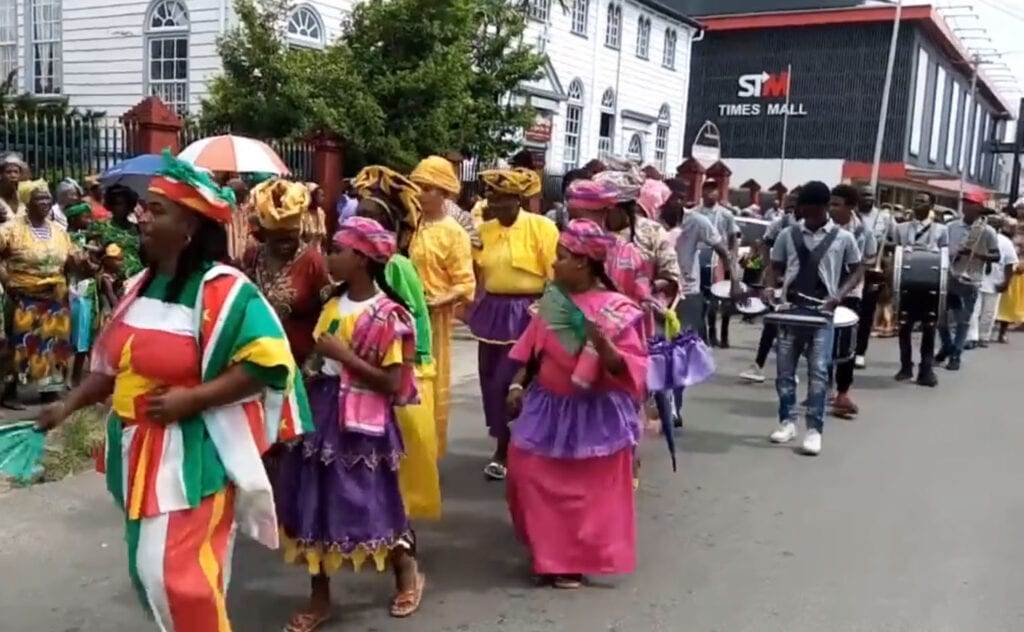
Since 2009, Keti Koti festivities have seen a colourful Bigi Spikri parade in Amsterdam. Since 2002, several other cities in the Netherlands have adopted the celebrations, but it’s still yet to be declared a national holiday by the Dutch government.
The most famous commemorative ceremony occurs in the Oosterpark in Amsterdam, where the National Slavery Monument is located.
The Mayor of Amsterdam and other national and foreign representatives are often present. After this formal ceremony, the full Keti Koti Festival officially starts (at the same location).
During the festival, various performances and lectures take place on stages set up by the organisers. The festival is free to enter, and the commemoration is broadcast live on national television (NPO).
In Curaçao, they commemorate Emancipation Day on August 17. The day that a great slave revolt broke out in 1795. This day is called the “Dia di lucha pa libertat” (“Day of the Struggle for Freedom”), a national holiday in Curaçao.
The history behind the festival
Slavery in the Dutch Atlantic world had five distinct themes: the early colonies of Brazil and Nieuw Nederland; the West African forts; the plantation colonies on the Wild Coast (Suriname, Essequibo, Berbice, and Demerara); in the West Indies on the islands of Curaçao, St. Eustatius, Bonaire, Saba, St. Maarten, and Aruba; the Dutch participation in the transatlantic slave trade.
In the 19th century, abolitionism became increasingly popular. At this point, King William I was forced to issue a ban on the transatlantic slave trade via Dutch ships in 1814 by Royal Decree. However, this did not completely end the practice.
READ MORE | 12 World Heritage Sites in the Netherlands: the country’s top cultural monuments to visit
The abolition of slavery went through several phases in the Netherlands. This started with the directly administered territories of the Dutch East Indies on January 1, 1860.
This was the year the so-called Act establishing the Regulations on the policy of the government of the Dutch East Indies was introduced.
A few years later, the abolition of slavery in Suriname and the Netherlands Antilles followed. On July 1, 1863, the “Laws for the abolition of slavery in Suriname and the Netherlands Antilles” (better known as the Emancipation Law) outlawed slavery.
The law was passed as early as 1862 but was enacted on July 1 of the following year.
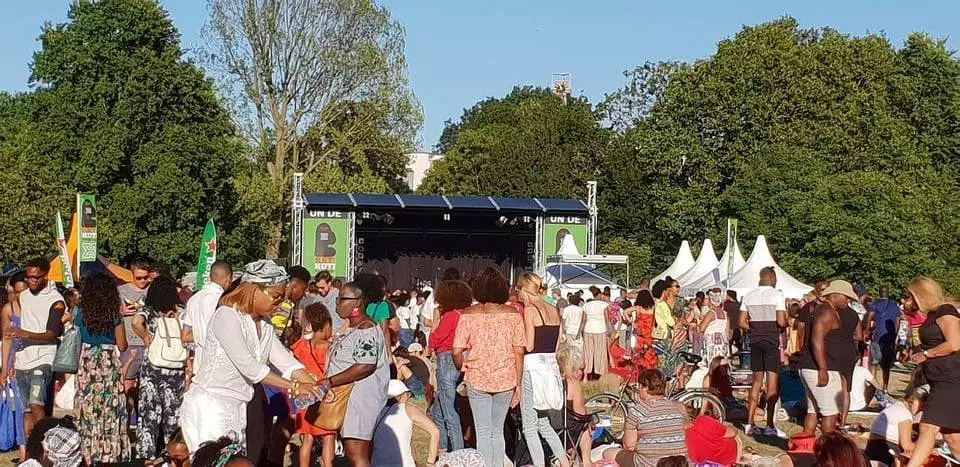
In the early morning of that day, 21 cannons were fired from Fort Zeelandia in Paramaribo to celebrate the abolition of slavery. Finally, in an official capacity, the chains of slavery in Suriname and the Netherlands Antilles were broken, and enslaved people became free people.
Freedom? By name alone
In Suriname, about 33,000 enslaved people and about 12,000 in the former Netherlands Antilles were freed. However, said freedom was relative. Enslaved people in Suriname didn’t taste full freedom until 1873.
Before this, there was a mandatory 10-year transition period where they worked on plantations for minimal pay and with state-sanctioned force.
If they stepped outside the plantation grounds without a pass, they could be jailed. Enslavers were also compensated for their “losses.”
In Suriname, they received 300 guilders per enslaved person and in Curaçao, Bonaire, Aruba, and St. Eustatius, the compensation varied from 150 to 250 guilders.
READ MORE | The life of the slaves in the Dutch colonies
While (former) slave traders and plantation owners received compensation for the loss of “free labour,” freedom didn’t mean sunshine and roses for the formerly enslaved people. Many continued working as essentially “poorly paid slaves” for their former masters and were often forced to sign exploitative contracts.
Many newly freed people signed contracts without knowing exactly what they signed because they never learned to read or write.
Still, many others had broken their chains and could finally live their own lives, even if it meant limited opportunities in a “white man’s world.”
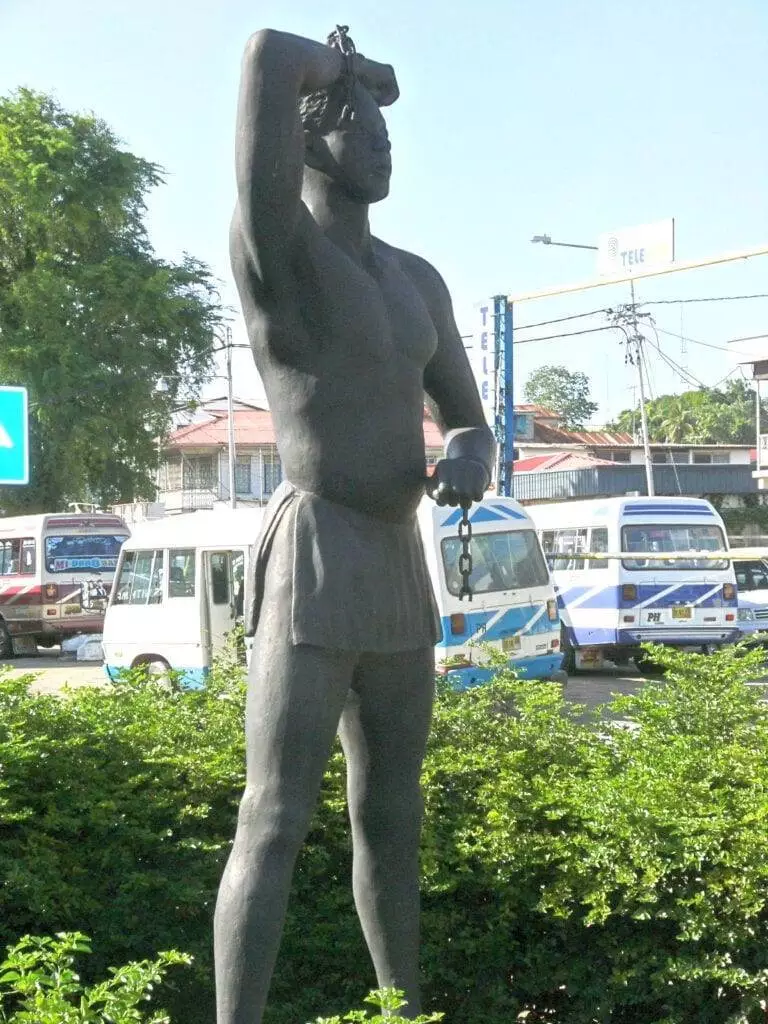
Keti Koti doesn’t just celebrate breaking the chains of these formerly enslaved people; it also sheds light on their stories, experiences, and lives after emancipation. A century after the legal abolition of slavery, locals unveiled a statue depicting a formerly enslaved person who had broken his chains in Paramaribo.
Like many others, this statue would come to mean so much to the Keti Koti celebrations in Suriname and other parts of the world.
Why do few Dutch people know about Keti Koti?
A possible answer to this question is that the Netherlands doesn’t like to be reminded of her atrocities. Here’s something to think about: the Dutch often point out how they were “victims” in history.
A prime example is the Nazi occupation of the Netherlands during WWII. Another example is the MH17 Malaysia Airlines Flight, shot down on July 17, 2014, over eastern Ukraine while flying from Amsterdam to Kuala Lumpur.
Investigations revealed that three Russians and one Ukrainian were responsible for downing the jetliner. Of course, the Netherlands has every right to call for those responsible to face the music.
There have also been calls from the Dutch government on Russia to hand over the perpetrators to face justice and to apologise to the Netherlands and the victims’ families.
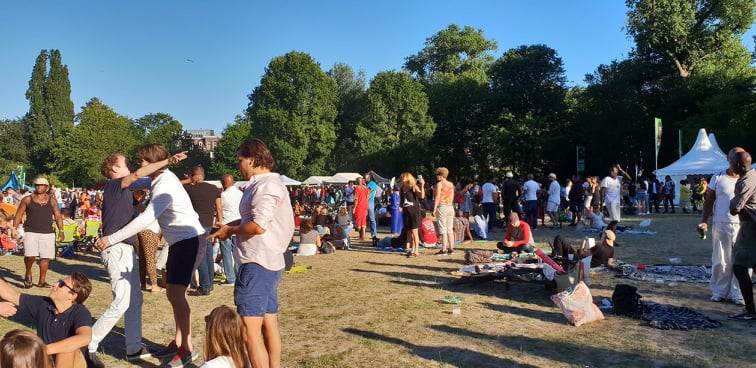
Wider Dutch society shows little to no interest in its involvement in slavery. Until the turn of the century, slavery was seen as something the USA did, not as a Dutch phenomenon.
Entire generations have grown up without learning anything about it because much of it isn’t covered in Dutch schools. As a result, very few white Dutch people know that slavery was at the crux of much of the wealth they gained from centuries of trade, exploitation, rape, and murder.
However, in recent years, the history of the Netherlands’ relationship with slavery has become an increasingly important point of discussion in the media, politics, and even in schools.
READ MORE | Rietveld, Colonialism and Art; an Interview with Dutch-Surinamese Artist, Remy Jungerman.
The Surinamese community in the Netherlands has asked the Dutch government to apologise for the Dutch slave trade for years officially.
Finally, at the end of 2022, Mark Rutte officially apologised for the Netherlands’ role in the slave trade.
The same Surinamese and other black communities in the Netherlands have long called for slavery to be mentioned in the Dutch history books and taught in schools. Currently, the Netherlands has done very little to that effect.
How has Keti Koti developed in the Netherlands in recent decades?
The Dutch government largely ignored Keti Koti throughout the 20th century, making it a quiet affair. This was because many Dutch people just weren’t interested. In the 80s and 90s, it was mainly celebrated in Surinamese circles, but as times change, these circles are growing and becoming more diverse.
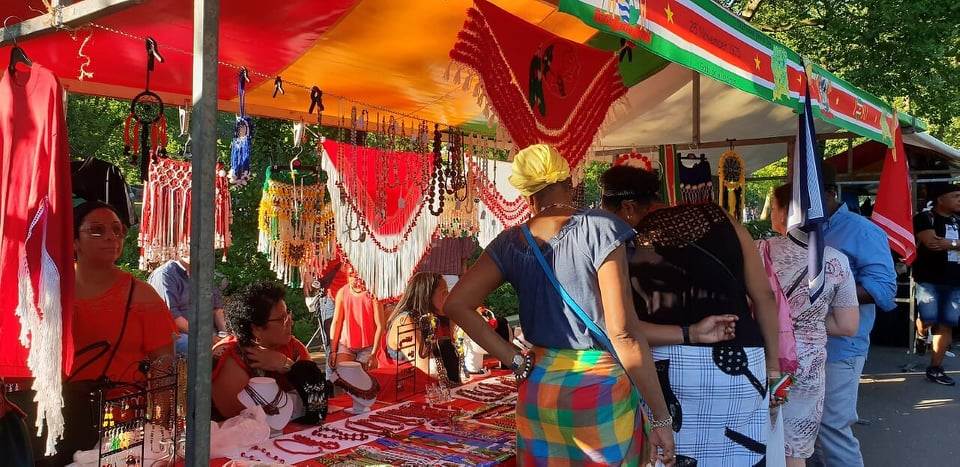
An important moment was the unveiling of the National Slavery Monument in Amsterdam’s Oosterpark in 2002. Rotterdam and Middelburg erected their own monuments in commemoration, and since then, Keti Koti has been celebrated in cities such as Deventer, Utrecht, and Berg en Dal.
Over the past ten years, a new generation of energetic and vocal young black people has emerged, devoting a lot of time and energy to making Keti Koti more popular.
Social media has also greatly helped their efforts. As the fight against Zwarte Piet and systemic racism continues to gain momentum in the Netherlands and abroad, the significance and popularity of Keti Koti also continue to grow.
How does the Dutch government view Keti Koti?
Some say that things may slowly be changing. The murder of the African-American George Floyd in 2020 by police officers in the US triggered worldwide protests against racism and police brutality.
These protests also found their way to the Netherlands, with people demonstrating against systemic racism. Protesters defaced several colonial-era statues and monuments.
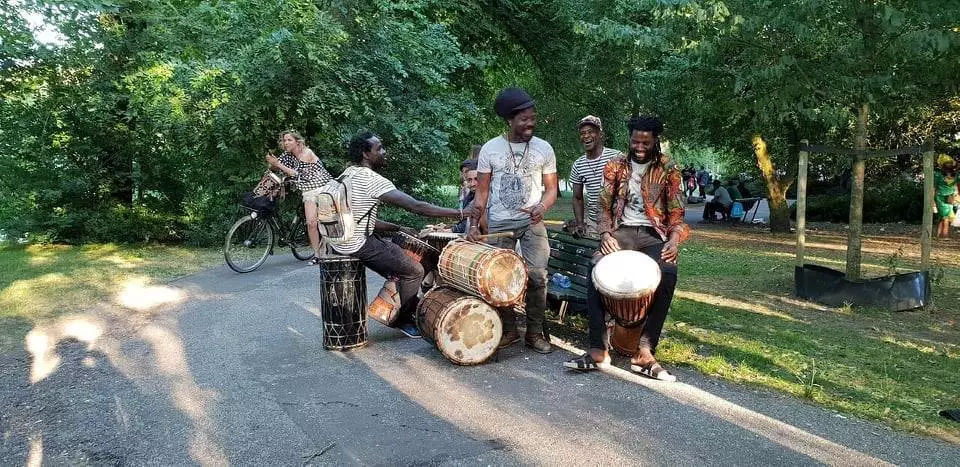
In light of the Black Lives Matter protests of 2020 and wider discussions about racism, it has become clear to many people in this country that the Dutch colonists were not just spice traders and explorers.
They committed all sorts of atrocities while also writing the history of slavery — the same history that has created a distorted picture of what they did.
It’s also important to note that the cultural sector in the Netherlands is predominantly white. For black history and art to be shown (which doesn’t just entertain but educates people), these cultural spaces must become more diverse and inclusive.
READ MORE | As a Black man, I can tell you that institutional racism in the Netherlands is running rampant: OP-ED
A lot of work has to be done for inclusion and diversity in the cultural and other sectors.
The first step is to have more non-white politicians in politics and the halls of power. A more inclusive and diverse parliament ensures that different perspectives are considered.
It is crucial that all communities in this country are equally considered when it comes to housing, poverty alleviation, education, business, the cultural sector, etc.,. A more inclusive and diverse parliament ensures that the voices of marginalised groups are also heard and taken seriously.
An important festival, whether you celebrate it or not
Some Surinamese and Caribbean people in the Netherlands don’t celebrate Keti Koti. They don’t consider it a festivity.
“How can you celebrate getting back something that should never have been taken from you in the first place?” they ask. They would rather have a memorial in self-reflection and silence, like May 4 in the Netherlands.
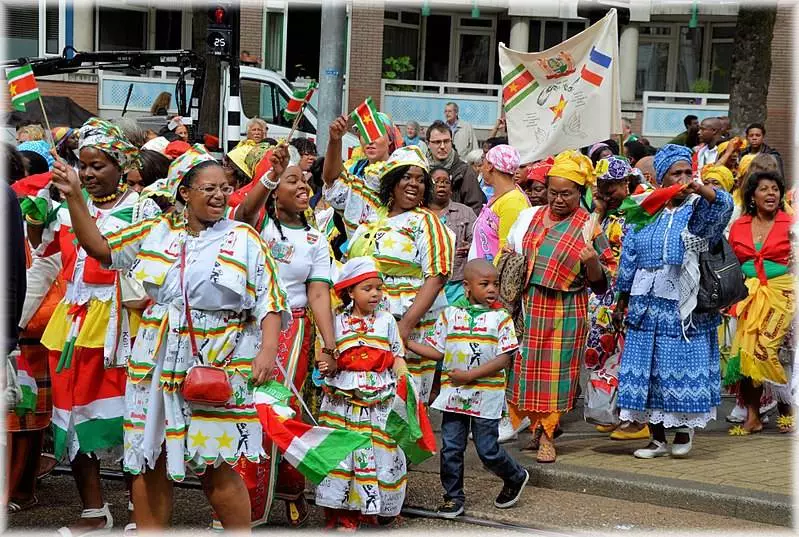
Whatever the opinion, Keti Koti remains filled with culture, colour, pomp, and circumstance. It must remain a day highlighting Dutch slavery history and past atrocities.
It continues to pressure those in power to apologise and do right by the descendants of those who gave blood, sweat, and tears to build this country.
The sacrifices that they were forced to make should not be forgotten. And the voices of their descendants should be amplified and rewarded. These and many more are the reasons why we celebrate Keti Koti.
What do you think about Keti Koti, and have you ever been to any of the celebrations? Tell us about your experiences in the comments!

My reply to the atrocities of slavery is to be found in my paintings.
For me the most important thing is not to receive an apology I WANT RECOGNITION and the history books to be re-written.
Such a bullshit.
It has never been an important day in the Netherlands, only in Suriname.
All of a sudden this year it’s becoming a thing in The Netherlands, a day against apartheid. I hope everyone remembers the discrimination based on medical status these past 1,5 years.
Discrimination is all very normal in the country. When you favour immigrants for a job, because of regulations, you automatically discriminate against the autochthonous inhabitants. If you favour younger people for a job, you discriminate the older ones. If you want a woman for the job, you discriminate the men. Etc etc.
A world without discrimination is great. But governments increase apartheid with their rules.
I would correct the sentence : “ why do the Dutch have the right to ask for apologies” for “why do the Dutch feel always entitled to ask for apologies”. Entitlement and lack of empathy is what white people still have in this country.
No greater fan of Suriname and the Surinam culture than this bakra. So allow me to make a few remarks.
“The Dutch are often very quick to point out how they were “victims” in history” — quite right.
But it is a phenomenon that is of the last 25 years. Several fellow-boomers have pointed out before me that there has been a remarkable swing to the right over the last 2, 3 decades. National guilt was the prevalent mood in the ’60s and ’70s when the Dutch were almost competing in the international forum to depict themselves as the Worst Colonists Ever (including yours truly, until I traveled the Portuguese colonies, and had the pleasure of meeting some heroes of the Indonesian Independence, notably Hatta and Nasution).
Nobody resents this ‘Rechtsrueck’ more than I do. But one unholy component of it is exactly that what you have signaled: the “victim mentality” which allows one to claim moral superiority. Nothing you do or say can be wrong or criticised, because you are a victim. Says, amongst others, Ofer Zur, a world-class professor of psychology — himself a dual-citizenship Israeli, who by that fact alone must be considered an expert.
Unfortunately, you are in your otherwise excellent article playing that same victim card…
I do not know why governments do not issue a formal apology, if that is something of symbolic importance to many people. The same issue plays in my current station Australia. But I can for the life of me not see how it makes any difference in your daily life, or how it would abate discrimination. Accept my personal apologies: my great-grandparents ran a small pub in Bolslawier, just North of Dokkum, and I assume they were right regular racist bastards, so I apologise. And with that I have absolved myself, and gave you formal right to claim victimhood and be morally superior… How can that be good?
The Dutch Government needs to establish an international stock market listed, International Investment fund in which the entire population of the Netherlands can invest and save to improve international relations… they can save the dividends in various currencies.
Keti Koti IS NOT A DUTCH HOLIDAY. Its a SURINAM national HOLIDAY. Surinamese descendants living in Holland celebrate this day.
Its not A national holiday in Holland
I just stumbled upon this article as I’m just being familiarized with Keti Koti in the Netherlands. I am Colombian, so of course I am a mix of African slaves, slaved indigenous communities and, also a bit of Spanish colonizers. Having lived in the Netherlands for 2 years now, it just seems unbelievable how Dutch slavery phenomenon and active role in human-trade has been overlooked in history books and state policies. Moreover, how people with degrees and the highest education often try to minimize the Dutch slaverist past when you discuss the topic with them. I just can’t imagine how powerful and reassuring a public apology would mean to you. So, I do feel a lot of empathy for your people as I also live in the Zuidoost of Amsterdam and co-exist with this beautiful and resilient community. Long live to Keti Koti and all brave and resilient people of Suriname and the Antilles!
That’s the first I heard of Keti Koti. Here in the VSA our history of slavery recently became a political football of sorts with right wing politicians trying to ban study of our history of slavery in schools and colleges. This at the same time that the celebration call “Juneteenth” is becoming mainstream. Juneteenth celebrates the time when news of emancipation belatedly reached the slave states effectively setting the slaves free. Like Keti Koti, Juneteenth was also relatively unknown among whites. I (a white person) heard of Junetheenth years before ever knowing what it was about. To me, slavery eloquently demonstrates a flaw in capitalism. Slavery is human beings held traded and used as capital to generate profit for the owner of the capital.